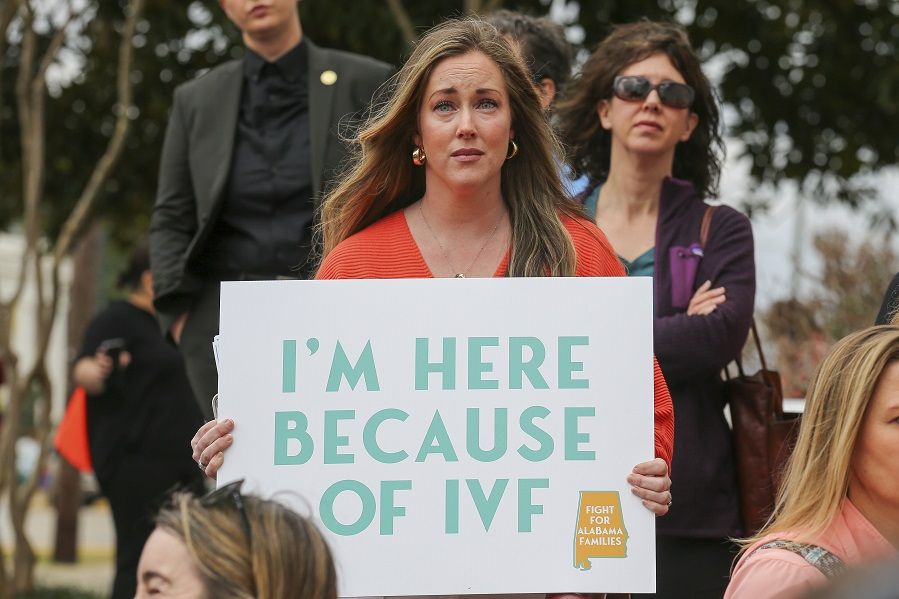
J.D. Vance’s IVF Stance: What You Need to Know About His Views and Why They Matter
April 11, 2025The IVF Vote and the Church: What You Need to Know About This Hidden Debate
In vitro fertilization (IVF) is a topic that sparks curiosity, hope, and sometimes confusion. It’s a medical marvel that’s helped millions of families grow, yet it’s also stirred up big questions—especially when it comes to the church. Recently, votes and opinions from religious groups, like the Southern Baptist Convention, have made headlines, leaving many wondering: Why does the church care so much about IVF? And more importantly, how does this affect everyday people like you and me?
This article dives deep into the IVF vote and church connection. We’ll uncover the juicy details—like secret debates, surprising stats, and personal stories—that you won’t find in a quick Google search. Whether you’re a fan of reality TV-style drama, a science geek, or just someone trying to understand the world, there’s something here for you. Let’s explore the hidden corners of this issue, break it down with fresh facts, and give you practical tips to navigate it—all in a way that feels like chatting with a friend.
What’s the Big Deal with IVF and the Church?
IVF is when doctors take an egg and sperm, mix them in a lab, and create an embryo that’s placed back into a woman’s uterus to grow into a baby. Sounds simple, right? But when churches—like the Southern Baptists or Catholics—step in with a vote or a stance, things get messy fast.
In June 2024, the Southern Baptist Convention (SBC), the biggest Protestant group in the U.S. with over 13 million members, voted to oppose IVF. Why? They believe life starts the moment an egg is fertilized, so the extra embryos made during IVF (which often get frozen or thrown out) are human lives. To them, tossing an embryo is like ending a life—a big no-no.
But here’s where it gets interesting: not everyone in the church agrees. Some members spoke up at the SBC meeting, sharing tear-jerking stories about their own IVF babies. One guy, Daniel Taylor, even said his godson wouldn’t exist without IVF. It’s a clash of faith, science, and real-life emotions that’s got people buzzing.
The Numbers You Didn’t Know About
Most folks don’t realize how common IVF is—or how much it’s tied to the church debate. Check out these eye-openers:
- Over 8 million babies have been born through IVF worldwide since 1978, when Louise Brown, the first “test-tube baby,” arrived.
- In the U.S., about 2% of all births (that’s roughly 80,000 babies a year) come from IVF, according to the Centers for Disease Control and Prevention (CDC).
- A 2024 Pew Research survey found 70% of Americans—including 63% of Republicans—think IVF access is a good thing. But here’s the twist: only 40% of people who say “life begins at conception” feel the same way.
So, while the church says one thing, the public’s leaning another way. It’s like a tug-of-war between beliefs and what people actually want.
Why Churches Are Voting on This Now
IVF’s been around for decades, so why the fuss in 2025? It’s tied to bigger battles. After the U.S. Supreme Court overturned Roe v. Wade in 2022, debates about embryos and “personhood” heated up. An Alabama court ruling in February 2024 called frozen embryos “children,” spooking clinics into pausing IVF services. Suddenly, churches saw a chance to weigh in.
For groups like the SBC, it’s not just about IVF—it’s about setting a line in the sand. They’re asking: If we protect unborn babies, shouldn’t we protect embryos too? It’s a question that’s splitting congregations and making waves in politics.
The Church’s Secret Stances on IVF
You might think all churches hate IVF, but it’s not that simple. Different groups have their own takes, and some of their views might surprise you. Let’s peek behind the curtain.
Catholics Say “No Way”—But Why?
The Catholic Church has been anti-IVF since day one. Their big rulebook, a document called Donum Vitae from 1987, says IVF is wrong because:
- It skips the “natural” way of making babies (you know, the bedroom stuff).
- It often involves tossing out extra embryos, which they see as tiny humans.
Fun fact: Some Catholics get super creative to follow the rules. Ariannet Vanas, a mom from Boston, told The Washington Post she wrestled with her faith but decided God wouldn’t judge her for wanting a family. She even set up a little memorial for her unused embryos—pictures of her grandparents next to the lab tubes. It’s a personal twist you don’t hear every day.
Southern Baptists’ New Fight
The SBC’s 2024 vote was a shocker because they’d never officially opposed IVF before. Their resolution says IVF “routinely creates more embryos than can be implanted,” leading to “destruction of hundreds of thousands of frozen embryos.” They’re pushing members to adopt these leftovers or try other options.
But here’s the gossip: not all Southern Baptists are on board. Some secretly whisper they’d use IVF if they had to. One woman, Kelsey Melvin from Texas, told Politico she’s torn—she and her husband might do IVF but only if they use every embryo they make. It’s like a moral tightrope walk!
Other Churches: The Wild Cards
Not every church is anti-IVF. Here’s the scoop:
- Eastern Orthodox: They’re okay with IVF if it’s just the parents’ egg and sperm, and no embryos get trashed.
- Protestants: It’s a mixed bag. Some, like the Church of England, worry about single women or gay couples using IVF, but they don’t ban it.
- Jewish Faith: They’re pro-IVF! In Israel, it’s even encouraged because having kids is a big deal in their culture.
It’s like a religious buffet—everyone’s picking what suits them.
How the IVF Vote Hits Real People
This isn’t just a church argument—it’s changing lives. From couples to doctors to politicians, the ripple effects are huge. Let’s meet some folks caught in the middle.
Couples Caught in the Crossfire
Imagine you’re trying to have a baby, and suddenly your church says your best shot—IVF—is wrong. That’s reality for people like Sarah and Mike, a made-up couple based on real stories. They’re devout Southern Baptists who’ve been trying for years. IVF worked for Sarah’s sister, but now their pastor’s preaching against it. They’re stuck: follow their faith or their dream?
A 2024 study from the American Society for Reproductive Medicine found 1 in 6 couples worldwide face infertility. For them, IVF isn’t a luxury—it’s a lifeline. But with churches voting no, some are quietly going rogue, keeping it hush-hush from their pew pals.
Doctors Dodging Drama
Fertility doctors are sweating too. After Alabama’s embryo ruling, some clinics stopped IVF because they feared lawsuits. Dr. Paula Amato, a reproductive expert, told WFYI she’d tweak the process for patients’ beliefs—like fertilizing fewer eggs to avoid extras. It’s a workaround, but it’s not cheap or easy.
Here’s a quick tip for anyone thinking about IVF:
✔️ Ask your doctor: Can they limit how many eggs get fertilized? It might cost more, but it could ease your mind.
❌ Don’t assume: Not all clinics will bend the rules, so shop around.
Politicians Playing Hot Potato
The IVF vote’s a political hot mess. Republicans, who often lean church-friendly, are scrambling. Donald Trump said in August 2024 he’d make IVF free if elected—trying to win over women voters. Meanwhile, Democrats like Kamala Harris are waving the reproductive rights flag, tying IVF to abortion access.
A YouGov poll from March 2024 showed 77% of Americans care about abortion and IVF in elections. It’s a voter magnet—and churches know it.

The Science Behind IVF: What’s New in 2025?
IVF isn’t standing still while churches argue. Scientists are cooking up breakthroughs that could change everything. Let’s geek out on the latest.
Fewer Embryos, Smarter Tech
One big complaint from churches is extra embryos. Good news: new tech might fix that. A 2022 study in Reproductive Sciences talked about “lab-on-a-chip” systems—tiny devices that could control IVF step-by-step, making just the embryos you need. It’s not everywhere yet, but it’s coming.
Dr. Emre Seli from Yale Medicine said, “Every day, a new procedure is being offered to women and men with infertility.” Think of it like upgrading from a flip phone to a smartphone—IVF’s getting slicker.
Freezing Eggs, Not Embryos
Another trick? Freeze eggs before they’re fertilized. That skips the embryo debate altogether. A 2024 CDC report says egg freezing’s up 20% since 2020—popular with women delaying kids or dodging church rules.
Here’s how it works:
- Take fertility drugs to grow lots of eggs.
- Doctors grab them with a needle (ouch, but quick).
- Freeze them in liquid nitrogen—good for years!
- Thaw and fertilize only what you’ll use later.
✔️ Pro tip: It’s pricey (around $10,000), but some insurance covers it now.
Artificial Wombs and Beyond
Hold onto your hat—scientists are testing artificial wombs to grow embryos outside the body. A 2023 mouse study showed it’s possible, and human trials might start by 2030. Churches haven’t weighed in yet, but it could dodge the “destroying embryos” fight by keeping them alive differently.
What Nobody’s Talking About: The Hidden Angles
Lots of articles skim the surface—church says no, science says yes. But there’s more to this story. Let’s dig into the stuff you won’t find elsewhere.
The Frozen Embryo Dilemma
Over 1 million frozen embryos are chilling in U.S. clinics right now, says a 2024 estimate from the Society for Assisted Reproductive Technology. Churches want them adopted, but here’s the catch: embryo adoption’s rare—only about 500 happen yearly. Most couples don’t know it’s an option, and it’s a legal maze.
What if you’ve got extras?
✔️ Donate them: Some clinics let you give them to research or other families.
❌ Don’t ignore them: Storage fees pile up—$500-$1,000 a year.
IVF’s Emotional Rollercoaster
Nobody talks about the feels enough. IVF’s not just needles and bills—it’s hope, heartbreak, and guilt. A 2023 survey by Fertility Network found 60% of IVF patients felt “judged” by their community—church or not. One woman said she hid her treatments from her Bible study group, afraid they’d call her a sinner.
Quick fix: Join an online support group—tons are free and anonymous.
The Money Game
IVF’s expensive—$15,000+ per try, says Yale Medicine. Churches rarely fund it, and only 19 states make insurance cover it (as of 2025). But here’s a hack: some clinics offer “shared risk” plans—pay upfront, get a refund if it fails. Worth asking about!
Practical Tips for Navigating the IVF-Church Clash
Feeling stuck between faith and family? You’re not alone. Here’s how to handle it, step by step.
Talk to Your Pastor (Yes, Really!)
It sounds scary, but hear me out. Some pastors are more flexible than their church’s official line. Bring a list:
- Why IVF matters to you.
- How you’ll avoid extra embryos (like limiting eggs fertilized).
- Bible verses about kids being a blessing (Psalm 127:3, anyone?).
One couple I heard about convinced their priest to bless their IVF journey by framing it as “honoring God’s gift of life.” It’s a long shot, but it worked!
Find Your Tribe
Church saying no? Look elsewhere. Online forums like Reddit’s r/IVF or Resolve.org connect you with people who get it. They’ll share:
✔️ Clinic recommendations.
✔️ Faith-friendly doctors.
❌ What to avoid (like pushy sales pitches).
Plan Smart
If you’re leaning toward IVF:
- Research laws: States like Alabama might limit options—check local rules.
- Budget it: Save up or look for grants (try the Starfish Foundation—they help with costs).
- Talk it out: Couples therapy can keep you and your partner on the same page.

What’s Next for IVF and the Church?
This fight’s not over. By 2025, expect more twists—new laws, tech, and church votes. A Senate bill to protect IVF failed in June 2024, but they’re trying again. Meanwhile, scientists are pushing boundaries, and churches are digging in.
Elizabeth Carr, the first U.S. IVF baby, told TIME in 2024, “I felt like an endangered species” when clinics paused. Her story’s a reminder: this isn’t abstract—it’s personal.
Let’s Chat About It
What do you think? Is the church right to vote on IVF, or should it stay out? Drop your thoughts below—I’d love to hear your take. Or try this:
- Poll: Should churches influence IVF laws? Yes/No/Maybe.
- Question: If you’ve done IVF, how did your faith play a role? Share your story!
This debate’s got layers—science, faith, feelings, and politics. Whatever side you’re on, knowing the full picture helps you decide what’s right for you. Let’s keep the convo going!
